| Listing 1 - 10 of 12 | << page >> |
Sort by
|
Book
ISBN: 0791477339 1435686934 9781435686939 0791476472 0791476480 9780791476475 9780791476482 9780791477335 9780791477335 Year: 2008 Publisher: Albany, NY : SUNY Press,
Abstract | Keywords | Export | Availability | Bookmark
 Loading...
Loading...Choose an application
- Reference Manager
- EndNote
- RefWorks (Direct export to RefWorks)
The definitive scholarly edition and new translation of all three versions of Hölderlin's poem, The Death of Empedocles, and his related theoretical essays.
German literature. --- Empedocles --- Empédocle --- Empedokles
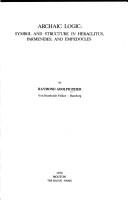
ISBN: 9027931550 3110805340 9783110805345 9789027931559 Year: 1976 Volume: 11 Publisher: The Hague Mouton
Abstract | Keywords | Export | Availability | Bookmark
 Loading...
Loading...Choose an application
- Reference Manager
- EndNote
- RefWorks (Direct export to RefWorks)
Heraclitus, --- Parmenides. --- Empedocles. --- Philosophy, Ancient --- Structuralism --- Parmenides --- Empedocles --- Philosophy, Ancient. --- Structuralism. --- Symbolism. --- Symbolism --- Philosophie ancienne --- Symbolisme --- Structuralisme --- Structure (Philosophy) --- Philosophy --- Whole and parts (Philosophy) --- Form (Philosophy) --- Poststructuralism --- Representation, Symbolic --- Symbolic representation --- Mythology --- Emblems --- Signs and symbols --- Ancient philosophy --- Greek philosophy --- Philosophy, Greek --- Philosophy, Roman --- Roman philosophy --- Empédocle --- Empedokles --- Eraclito, --- Geraklit, --- Heracleitus, --- Heraclit, --- Héraclite, --- Heraclito --- Hērakleitos, --- Heraklit, --- Herakʻŭlleitʻosŭ --- Kheraklit, --- היראקליטוס --- Ἡράκλειτος, --- Heraclitus --- Héraclite --- Heraclitus van Efese --- Heraclitus van Ephese --- Herakleitos --- Eraclito --- Heraclitus, - of Ephesus
Book
ISBN: 9783110209143 3110209144 1282425919 9786612425912 3110213982 9783110213980 Year: 2009 Volume: 264 Publisher: Berlin New York W. De Gruyter
Abstract | Keywords | Export | Availability | Bookmark
 Loading...
Loading...Choose an application
- Reference Manager
- EndNote
- RefWorks (Direct export to RefWorks)
This book presents an introduction to a new edition of Diogenes Laertios' Greek text (Cambridge University Press) by Tiziano Dorandi. It consists of three parts. The first contains the list of manuscripts, in the second, the author examines the main elements in the transmission, and in the third, he demonstrates the history of the text in the Middle Ages and the Renaissance.
Philosophers, Ancient --- Philosophes anciens --- Diogenes Laertius. --- Diogenes, Laertius --- Diogenes . --- Diogenes Laertius. Lives, teachings, and sayings of famous philosophers. --- Diogenes Laertius. Vite dei filosofi. --- Empedocles. --- Handwriting. --- Textgeschichte. --- Educational Institutions --- Ancient philosophers --- Philosophers, Ancient. --- Philosophy, Ancient. --- Ancient philosophy --- Greek philosophy --- Philosophy, Greek --- Philosophy, Roman --- Roman philosophy --- Vitae philosophorum. --- Ancient Philosophy. --- History of the Text.
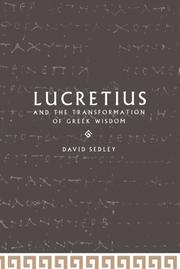
ISBN: 1107113318 1280429143 9786610429141 0511172052 051102083X 0511149948 0511309929 0511482388 0511053606 9780511020834 9780511482380 9780521570329 0521570328 9780521542142 0521542146 9781107113312 9781280429149 6610429146 9780511172052 9780511149948 9780511309922 9780511053603 Year: 1998 Publisher: Cambridge : Cambridge University Press,
Abstract | Keywords | Export | Availability | Bookmark
 Loading...
Loading...Choose an application
- Reference Manager
- EndNote
- RefWorks (Direct export to RefWorks)
This book is designed to appeal both to those interested in Roman poetry and to specialists in ancient philosophy. In it David Sedley explores Lucretius' complex relationship with Greek culture, in particular with Empedocles, whose poetry was the model for his own, with Epicurus, the source of his philosophical inspiration, and with the Greek language itself. He includes a detailed reconstruction of Epicurus' great treatise On Nature, and seeks to show how Lucretius worked with this as his sole philosophical source, but gradually emancipated himself from its structure, transforming its raw contents into something radically new. By pursuing these themes, the book uncovers many unrecognised aspects of Lucretius' methods and achievements as a poetic craftsman.
Didactic poetry, Latin --- Philosophy, Ancient, in literature. --- Latin poetry --- History and criticism. --- Greek influences. --- Lucretius Carus, Titus. --- Lucretius Carus, Titus --- Theophrastus --- Empedocles --- Epicurus --- Empédocle --- Empedokles --- Feofrast --- Theophrast --- Théophraste --- Theophrastos --- Teofrasto --- Theophrastus, --- Θεόφραστος --- Lukrecjusz Karus, Tytus --- Lukret︠s︡iĭ Kar, Tit --- Lucrezio, Tito --- Lucrèce --- Lucrez --- Lukrez --- Lucrecio Caro, T. --- Caro, T. Lucrecio --- Carus, Titus Lucretius --- Lucretius --- Lucrezio Caro, Tito --- Lucrecio --- Lucreti Cari, T. --- Lucreci --- לוקרציוס קרוס, טיטוס --- Ἐπίκουρος --- Epikouros --- Epikuros --- Ėpikur --- Epiḳoros --- Epicuro --- Abīqūr --- Yibijiulu --- Epicure --- Epʻikʻurosŭ --- Knowledge --- Greece. --- Influence. --- Philosophy, Ancient, in literature --- History and criticism --- Greek influences --- Poésie latine --- Poésie didactique latine --- Philosophie ancienne dans la littérature --- Influence grecque --- Histoire et critique --- Arts and Humanities --- History --- Influence --- Didactic poetry [Latin ] --- Philosophy [Ancient ] in literature --- Lucretius Carus, Titus. - De rerum natura. --- Didactic poetry, Latin - History and criticism. --- Latin poetry - Greek influences. --- Lucrezio --- Didactic poetry, Latin - History and criticism --- Latin poetry - Greek influences --- Lucretius Carus, Titus - De rerum natura --- Empedocles - Influence --- Epicurus - Influence
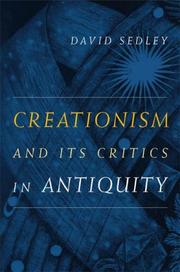
ISBN: 128235938X 9786612359385 0520934369 9780520934368 9780520253643 0520253647 9780520260061 0520260066 6612359382 Year: 2007 Publisher: Berkeley : University of California Press,
Abstract | Keywords | Export | Availability | Bookmark
 Loading...
Loading...Choose an application
- Reference Manager
- EndNote
- RefWorks (Direct export to RefWorks)
The world is configured in ways that seem systematically hospitable to life forms, especially the human race. Is this the outcome of divine planning or simply of the laws of physics? Ancient Greeks and Romans famously disagreed on whether the cosmos was the product of design or accident. In this book, David Sedley examines this question and illuminates new historical perspectives on the pantheon of thinkers who laid the foundations of Western philosophy and science. Versions of what we call the "creationist" option were widely favored by the major thinkers of classical antiquity, including Plato, whose ideas on the subject prepared the ground for Aristotle's celebrated teleology. But Aristotle aligned himself with the anti-creationist lobby, whose most militant members--the atomists--sought to show how a world just like ours would form inevitably by sheer accident, given only the infinity of space and matter. This stimulating study explores seven major thinkers and philosophical movements enmeshed in the debate: Anaxagoras, Empedocles, Socrates, Plato, the atomists, Aristotle, and the Stoics.
Philosophy, Ancient. --- Intelligent design (Teleology) --- Ancient philosophy --- Greek philosophy --- Philosophy, Greek --- Philosophy, Roman --- Roman philosophy --- Design, Intelligent (Teleology) --- Natural theology --- Philosophy of nature --- Teleology --- Creationism --- God --- Proof, Teleological --- Philosophy, Ancient --- accident. --- anaxagoras. --- ancient greek. --- ancient rome. --- anti creationist. --- antiquity. --- aristotle. --- classical antiquity. --- classical world. --- controversial. --- controversy. --- cosmos. --- creationism. --- creationist. --- disagreement. --- divine. --- empedocles. --- famous philosopher. --- great thinkers. --- historical. --- intelligent design. --- philosopher. --- philosophy. --- plato. --- scientific. --- socrates. --- stoics. --- teleology. --- theology. --- theory. --- western philosophy. --- western science.
Book
ISBN: 9780691180502 0691180504 9781400889761 1400889766 Year: 2018 Publisher: Princeton, NJ
Abstract | Keywords | Export | Availability | Bookmark
 Loading...
Loading...Choose an application
- Reference Manager
- EndNote
- RefWorks (Direct export to RefWorks)
A celebrated study of the origins of ancient Greek philosophy, now in English for the first timeHow can we talk about the beginnings of philosophy today? How can we avoid the conventional opposition of mythology and the dawn of reason and instead explore the multiple styles of thought that emerged between them? In this acclaimed book, available in English for the first time, Maria Michela Sassi reconstructs the intellectual world of the early Greek "Presocratics" to provide a richer understanding of the roots of what used to be called "the Greek miracle."The beginnings of the long process leading to philosophy were characterized by intellectual diversity and geographic polycentrism. In the sixth and fifth centuries BC, between the Asian shores of Ionia and the Greek city-states of southern Italy, thinkers started to reflect on the cosmic order, elaborate doctrines on the soul, write in solemn Homeric meter, or, later, abandon poetry for an assertive prose. And yet the Presocratics whether the Milesian natural thinkers, the rhapsode Xenophanes, the mathematician and "shaman" Pythagoras, the naturalist and seer Empedocles, the oracular Heraclitus, or the inspired Parmenides all shared an approach to critical thinking that, by questioning traditional viewpoints, revolutionized knowledge.A unique study that explores the full range of early Greek thinkers in the context of their worlds, the book also features a new introduction to the English edition in which the author discusses the latest scholarship on the subject.
Pre-Socratic philosophers. --- Vorsokratiker. --- Griechenland --- History of philosophy --- Greece --- Pre-Socratics --- Presocratic philosophers --- Presocratics --- Philosophers --- Anaximander. --- Aristotle. --- Empedocles. --- Francis MacDonald Cornford. --- Greek gods. --- Greek miracle. --- Greek philosophy. --- Greek thinkers. --- Heraclitus. --- Hesiod. --- Karl Popper. --- Metaphysics. --- Muses. --- Parmenides. --- Pherecydes of Syros. --- Presocratics. --- Thales. --- Theogony. --- Thetis. --- Xenophanes. --- archē. --- authorial voice. --- authority. --- celestial bodies. --- cosmogony. --- cosmos. --- critical thinking. --- egotism. --- epic poetry. --- geographic polycentrism. --- innovation. --- intellectual diversity. --- intellectual memory. --- intellectual world. --- knowledge. --- moral responsibility. --- muthos. --- myth. --- mythology. --- personal identity. --- philosophical rationality. --- philosophy. --- poetry. --- polis. --- prose. --- psuchē. --- rational argumentation. --- reason. --- salvation. --- soul. --- truth. --- writing.
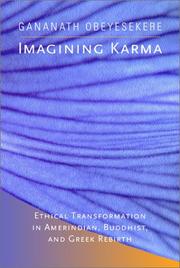
ISBN: 0520936302 1597346691 9780520936300 0585466432 9780585466439 9781597346696 9780520232204 0520232208 9780520232433 0520232437 Year: 2002 Publisher: Berkeley, CA ; London ; Los Angeles, CA : University of California Press,
Abstract | Keywords | Export | Availability | Bookmark
 Loading...
Loading...Choose an application
- Reference Manager
- EndNote
- RefWorks (Direct export to RefWorks)
With Imagining Karma, Gananath Obeyesekere embarks on the very first comparison of rebirth concepts across a wide range of cultures. Exploring in rich detail the beliefs of small-scale societies of West Africa, Melanesia, traditional Siberia, Canada, and the northwest coast of North America, Obeyesekere compares their ideas with those of the ancient and modern Indic civilizations and with the Greek rebirth theories of Pythagoras, Empedocles, Pindar, and Plato. His groundbreaking and authoritative discussion decenters the popular notion that India was the origin and locus of ideas of rebirth. As Obeyesekere compares responses to the most fundamental questions of human existence, he challenges readers to reexamine accepted ideas about death, cosmology, morality, and eschatology. Obeyesekere's comprehensive inquiry shows that diverse societies have come through independent invention or borrowing to believe in reincarnation as an integral part of their larger cosmological systems. The author brings together into a coherent methodological framework the thought of such diverse thinkers as Weber, Wittgenstein, and Nietzsche. In a contemporary intellectual context that celebrates difference and cultural relativism, this book makes a case for disciplined comparison, a humane view of human nature, and a theoretical understanding of "family resemblances" and differences across great cultural divides.
Religious ethics --- Reincarnation --- Past-lives regression --- Rebirth --- Regression, Past-lives --- Pre-existence --- Soul --- Theosophy --- Transmigration --- Reincarnation (Buddhism) --- Comparative studies. --- Buddhism. --- Reincarnation-Buddhism.. --- Reincarnation-Comparative studies.. --- Religious ethics-Comparative studies. --- Reincarnation - Buddhism. --- Reincarnation - Comparative studies. --- Religious ethics - Comparative studies. --- amerindian tradition. --- buddhism. --- buddhist tradition. --- canada. --- classicists. --- cosmology. --- cross cultural scholarship. --- cultural relativism. --- cultural stories. --- death. --- empedocles. --- ethics. --- greek tradition. --- human condition. --- indic civilizations. --- indologists. --- intellectual context. --- karma. --- melanesia. --- methodological framework. --- nietzsche. --- personal transformation. --- philosophy. --- pindar. --- plato. --- pythagoras. --- rebirth. --- reincarnation. --- siberia. --- textbooks. --- weber. --- west africa. --- wittgenstein.

ISBN: 1282271369 9786612271366 1400825075 9781400825073 9780691058092 0691058091 Year: 2002 Publisher: Princeton, N.J. Princeton University Press
Abstract | Keywords | Export | Availability | Bookmark
 Loading...
Loading...Choose an application
- Reference Manager
- EndNote
- RefWorks (Direct export to RefWorks)
Is "space" a thing, a container, an abstraction, a metaphor, or a social construct? This much is certain: space is part and parcel of the theater, of what it is and how it works. In The Play of Space, noted classicist-director Rush Rehm offers a strikingly original approach to the spatial parameters of Greek tragedy as performed in the open-air theater of Dionysus. Emphasizing the interplay between natural place and fictional setting, between the world visible to the audience and that evoked by individual tragedies, Rehm argues for an ecology of the ancient theater, one that "nests" fifth-century theatrical space within other significant social, political, and religious spaces of Athens. Drawing on the work of James J. Gibson, Kurt Lewin, and Michel Foucault, Rehm crosses a range of disciplines--classics, theater studies, cognitive psychology, archaeology and architectural history, cultural studies, and performance theory--to analyze the phenomenology of space and its transformations in the plays of Aeschylus, Sophocles, and Euripides. His discussion of Athenian theatrical and spatial practice challenges the contemporary view that space represents a "text" to be read, or constitutes a site of structural dualities (e.g., outside-inside, public-private, nature-culture). Chapters on specific tragedies explore the spatial dynamics of homecoming ("space for returns"); the opposed constraints of exile ("eremetic space" devoid of normal community); the power of bodies in extremis to transform their theatrical environment ("space and the body"); the portrayal of characters on the margin ("space and the other"); and the tragic interactions of space and temporality ("space, time, and memory"). An appendix surveys pre-Socratic thought on space and motion, related ideas of Plato and Aristotle, and, as pertinent, later views on space developed by Newton, Leibniz, Descartes, Kant, and Einstein. Eloquently written and with Greek texts deftly translated, this book yields rich new insights into our oldest surviving drama.
Theater --- Space and time in literature. --- Greek drama (Tragedy) --- Greek drama --- Space and time as a theme in literature --- History --- History and criticism. --- Ancient presentation --- Presentation, Ancient --- Space and time in literature --- History and criticism --- Space perception. --- Spatial perception --- Perception --- Spatial behavior --- Figure-ground perception --- Geographical perception --- 18.43 ancient Greek literature. --- Greek drama (Tragedy). --- Grieks. --- Ruimtelijke aspecten. --- Theater. --- Théâtre --- Tragedies. --- Tragédie grecque. --- Voorstellingen (uitvoerende kunsten). --- To 500. --- Greece. --- Theater - Greece --- Theater - History - To 500 --- Greek drama (Tragedy) - History and criticism --- Aegina. --- Alcibiades. --- Amazons. --- Beckett, Samuel. --- Chomsky, Noam. --- Diogenes of Apollonia. --- Eleatics. --- Empedocles. --- Foucault, Michel. --- Gellie, George. --- Goldhill, Simon. --- Halliburton, David. --- Heidegger, Martin. --- Heraclitus. --- Jameson, Michael. --- Lewin, Kurt. --- Loraux, Nicole. --- Newton, Isaac. --- Nightingale, Andrea. --- Palladion. --- Panhellenic norms. --- Parminides. --- Pnyx. --- Seaford, Richard. --- Themistocles. --- actors. --- architecture. --- dance. --- elements. --- ephebeia. --- exile. --- hero cult. --- landscape. --- memory. --- orality. --- role doubling. --- semiotics.
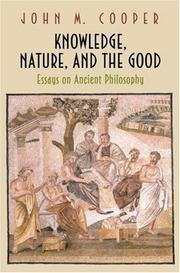
ISBN: 0691117241 0691117233 9786612087080 1282087088 1400826446 9781400826445 9780691117232 9780691117249 Year: 2004 Publisher: Princeton, N.J. Princeton University Press
Abstract | Keywords | Export | Availability | Bookmark
 Loading...
Loading...Choose an application
- Reference Manager
- EndNote
- RefWorks (Direct export to RefWorks)
Knowledge, Nature, and the Good brings together some of John Cooper's most important works on ancient philosophy. In thirteen chapters that represent an ideal companion to the author's influential Reason and Emotion, Cooper addresses a wide range of topics and periods--from Hippocratic medical theory and Plato's epistemology and moral philosophy, to Aristotle's physics and metaphysics, academic scepticism, and the cosmology, moral psychology, and ethical theory of the ancient Stoics. Almost half of the pieces appear here for the first time or are presented in newly expanded, extensively revised versions. Many stand at the cutting edge of research into ancient ethics and moral psychology. Other chapters, dating from as far back as 1970, are classics of philosophical scholarship on antiquity that continue to play a prominent role in current teaching and scholarship in the field. All of the chapters are distinctive for the way that, whatever the particular topic being pursued, they attempt to understand the ancient philosophers' views in philosophical terms drawn from the ancient philosophical tradition itself (rather than from contemporary philosophy). Through engaging creatively and philosophically with the ancient texts, these essays aim to make ancient philosophical perspectives freshly available to contemporary philosophers and philosophy students, in all their fascinating inventiveness, originality, and deep philosophical merit. This book will be treasured by philosophers, classicists, students of philosophy and classics, those in other disciplines with an interest in ancient philosophy, and anyone who seeks to understand philosophy in philosophical terms.
Ancient philosophy --- Antieke filosofie --- Filosofie [Antieke ] --- Filosofie [Griekse ] --- Filosofie [Romeinse ] --- Filosofie van de Oudheid --- Greek philosophy --- Griekse filosofie --- Philosophie ancienne --- Philosophie antique --- Philosophie de l'Antiquité --- Philosophie grecque --- Philosophie romaine --- Philosophy [Ancient ] --- Philosophy [Greek ] --- Philosophy [Roman ] --- Roman philosophy --- Romeinse filosofie --- Philosophy, Ancient. --- Knowledge, Theory of --- Naturalism --- Good and evil --- Théorie de la connaissance --- Naturalisme --- Bien et mal --- #GGSB: Filosofie --- #GGSB: Filosofie (oudheid) --- Théorie de la connaissance --- Philosophy, Greek --- Philosophy, Roman --- Philosophy, Ancient --- Filosofie --- Filosofie (oudheid) --- Academic skepticism. --- Alexander Nehamas. --- Alexander of Aphrodisias. --- Analogy. --- Antiochus of Ascalon. --- Aristotle. --- Arius Didymus. --- Atomism. --- Awareness. --- Cambridge University Press. --- Carneades. --- Chrysippus. --- Concept. --- Counterargument. --- Criticism. --- Democritus. --- Determinism. --- Dialectician. --- Disease. --- Empedocles. --- Epictetus. --- Epicureanism. --- Epicurus. --- Epistemology. --- Ethics. --- Eudaimonia. --- Existence. --- Explanation. --- Explication. --- Eye color. --- Feeling. --- First principle. --- Four causes. --- Glaucon. --- God. --- Good and evil. --- Hedonism. --- Hiero (Xenophon). --- Hypothesis. --- Illustration. --- Immanuel Kant. --- Indication (medicine). --- Inference. --- Ingredient. --- Inquiry. --- Isocrates. --- Lecture. --- Loeb Classical Library. --- Materialism. --- Methodology. --- Morality. --- Mutatis mutandis. --- Natural kind. --- On Ancient Medicine. --- Ontology. --- Parmenides. --- Phenomenon. --- Philosopher. --- Philosophical analysis. --- Philosophical methodology. --- Philosophical theory. --- Philosophy. --- Physician. --- Plato. --- Platonism. --- Potentiality and actuality. --- Practical reason. --- Pre-Socratic philosophy. --- Premise. --- Principle. --- Protagoras. --- Pyrrhonism. --- Quantity. --- Rationality. --- Reality. --- Reason. --- Requirement. --- Rhetoric. --- Self-sufficiency. --- Semen. --- Sextus Empiricus. --- Skepticism. --- Socratic method. --- Socratic. --- Stoicism. --- Suggestion. --- Teleology. --- The Philosopher. --- Theaetetus (dialogue). --- Theoretical physics. --- Theory of Forms. --- Theory. --- Thought. --- Treatise. --- Uncertainty. --- Understanding. --- Value theory. --- Virtue. --- W. D. Ross. --- Writing.
Book
ISBN: 0691020884 9781400863204 1400863201 9780691608273 069160827X 0691636745 Year: 1993 Publisher: Princeton, New Jersey : Princeton University Press,
Abstract | Keywords | Export | Availability | Bookmark
 Loading...
Loading...Choose an application
- Reference Manager
- EndNote
- RefWorks (Direct export to RefWorks)
This collection introduces readers to some of the most respected Pre-Socratic scholarship of the twentieth century. It includes translations of important works from European scholars that were previously unavailable in English and incorporates the major topics and approaches of contemporary scholarship. Here is an essential book for students and scholars alike. "Students of the Pre-Socratics must be grateful to Mourelatos and his publishers for making these essays available to a wider public."--T. H. Irwin, American Journal of Philology "Mourelatos is a superb editor, and teaching Pre-Socratics in the future with this collection on the reading list will not only be easier but also better."--Jorgen Mejer, The Classical World "The editor has done his work judiciously. It would be difficult to devise a better balance between different parts of the subject."--Edward Hussey, Archives internationales d'histoire des sciences "[This book] will undoubtedly become an indispensable aid for beginning and advanced students of the Pre-Socratics."--David E. Hahm, IsisOriginally published in 1994.The Princeton Legacy Library uses the latest print-on-demand technology to again make available previously out-of-print books from the distinguished backlist of Princeton University Press. These editions preserve the original texts of these important books while presenting them in durable paperback and hardcover editions. The goal of the Princeton Legacy Library is to vastly increase access to the rich scholarly heritage found in the thousands of books published by Princeton University Press since its founding in 1905.
Philosophy, Ancient --- Ancient philosophy --- Greek philosophy --- Philosophy, Greek --- Philosophy, Roman --- Roman philosophy --- History of philosophy --- Antiquity --- Philosophy, Ancient. --- Academic skepticism. --- Ad hoc hypothesis. --- Agnosticism. --- Ambiguity. --- Anaxagoras. --- Anaximander. --- Anaximenes. --- Anthropomorphism. --- Antinomy. --- Aphorism. --- Apologue. --- Aristotle. --- Arthur Schopenhauer. --- Astral body. --- Atomism. --- Callicles. --- Classical element. --- Concept. --- Consciousness. --- Contradiction. --- Conventionalism. --- Critique. --- Democritus. --- Deprecation. --- Dialectician. --- Divine law. --- Dualism (philosophy of mind). --- Dualism. --- Empedocles. --- Empiricism. --- Eristic. --- Etymology. --- Existence. --- Explanation. --- Family resemblance. --- First principle. --- Form of life (philosophy). --- Formal fallacy. --- Good and evil. --- Heraclitus of Ephesus. --- Hippasus. --- Historicism. --- Idealism. --- Identity of indiscernibles. --- Infinite regress. --- Leucippus. --- Leveling (philosophy). --- Logical extreme. --- Logical reasoning. --- Logos. --- Lucretius. --- Magna Moralia. --- Materialism. --- Middle term. --- Modern physics. --- Moral relativism. --- Multitude. --- Mutatis mutandis. --- Mythopoeic thought. --- Naturalness (physics). --- Neoplatonism. --- Noema. --- Nous. --- Ontology. --- Paradox. --- Parmenides. --- Perspectivism. --- Philolaus. --- Philosopher. --- Philosophy. --- Physics (Aristotle). --- Plato. --- Positivism. --- Pre-Socratic philosophy. --- Principle of sufficient reason. --- Pseudoscience. --- Pyrrhonism. --- Pythagoreanism. --- Reality. --- Reason. --- Relativism. --- Religion. --- Sophistication. --- Subjectivism. --- Superiority (short story). --- The Concept of Mind. --- The Philosopher. --- The Soul of the World. --- Themistius. --- Theory of Forms. --- Theory. --- Thought. --- Truism. --- Unconscious inference. --- Unity of opposites. --- Verisimilitude. --- Wesley C. Salmon. --- Xenophanes. --- Zeno of Elea. --- Zeno's paradoxes.
| Listing 1 - 10 of 12 | << page >> |
Sort by
|

 Search
Search Feedback
Feedback About
About Help
Help News
News